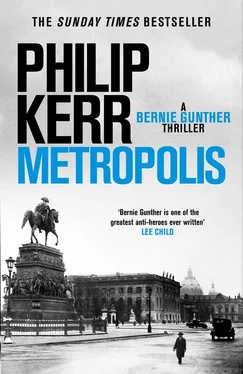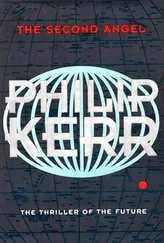‘You can put the bag of salt away,’ I said. ‘I’m not interested in that. I’m more interested in talking about one of your regular customers. Half-silk. Name of Eva Angerstein.’
‘They’ve got names? You surprise me.’
‘This one has a photograph.’
I handed him the picture and he took it between a greasy thumb and forefinger, found some glasses in the breast pocket of his jacket, looked at the photo, ate a bit of a sausage he obviously wasn’t going to sell that night, and then nodded.
‘Nice-looking girl.’
‘Isn’t she just.’
‘All right, I know her,’ he admitted. ‘Buys from me two or three nights a week. Too much to use herself. Takes it to one of the clubs, I reckon, and probably sells it in the ladies’ toilets. I take that into account when I give her the price.’
‘When did you last see her?’
‘Last night. About this time. Why? What’s she done?’
‘She’s been murdered.’
‘Pity. Lot of that about these days. As a matter of fact it’s got so bad that some of these girls are afraid to work. You wouldn’t think it, but there’s only half as many girls on the streets these days. Afraid of getting scalped by Winnetou. Well, who wouldn’t be? Was she scalped?’
‘I couldn’t say.’
‘You just did. So Eva bought some salt and then went to talk to those girls over there. At least I think it was them. Hard to tell them apart from this distance. Then after a few minutes this fellow comes into the station and eventually she leaves with him. Out the front door.’
‘Could you describe him?’
‘Now you’re asking. These girls talk to more men than I sell sausages. It’d be like you asking me to describe a wurst I just sold.’
‘Try.’
‘Well dressed. Gentleman, looked like. Wore his hat on the side of his head. Sort of rakishly. Big raincoat. I was only half paying attention.’ He shrugged. ‘That’s about it. You’d best ask the grasshoppers. They don’t miss anything. In less than ten seconds they can size you up and tell how much you’ve got in your pockets and if you’re in the mood for some mouse or not.’
He was right.
I turned towards the girls, but they’d already taken a good look at me talking to the sausage seller, concluded I was police, and scattered to the four winds. I walked back to my informant.
‘See what I mean?’ He laughed. ‘They had you fingered as a bull the minute you handed me that photograph, son. Hard enough to make a living without you scaring away the fish.’
I nodded and turned away wearily. My bed in Nollendorfplatz felt very close by and I badly wanted to be there. On my own.
‘One more thing,’ said the sausage seller. ‘I don’t think it was him who killed her. The Fritz with the hat, I mean.’
‘Why do you say so?’
‘Because it’s my opinion he didn’t look or sound like he was going to kill anyone.’
‘How do you mean?’
‘Well, he was whistling, wasn’t he? Fellow who’s going to scalp a girl and kill her doesn’t whistle before he does it. Does he? No. I wouldn’t say so. A man whistling is a carefree sort of sound, I’d say. Hardly the type to go on the warpath.’
‘You’re probably right. But just as a matter of interest, do you remember the tune he was whistling?’
‘No. Not a chance, I’m afraid. I’m tone deaf. Here. Have a sausage. On the house. I’m not going to sell these and I’m knocking off soon. They’ll only go to waste.’
Back outside the courtyard in Wormser Strasse, eating my sausage in the darkness, I barked my shins on some short wooden crutches and a vagrant’s trolley, the type a legless or partially paralyzed man might have used in lieu of a proper wheelchair to get around the city. It reminded me of some medieval painting of amusing German beggars wearing cardboard crowns and foxtails on their backs. We always had a cruel sense of humour in Germany. The trolley was homemade and crude, but many men had little choice but to use one. Modern orthopaedic wheelchairs of the kind produced by Germany’s agency for the disabled were expensive and, immediately after the war, there had been many instances of men being robbed of them. Maybe that’s why it struck me as strange that one of these ‘cripple-carts’, as they were commonly known, should have been abandoned in this way. Where was the man who’d been using it? And it says a lot about my own attitude to Germany’s disabled that I should have forgotten about this cart almost as soon as I’d encountered it earlier in the evening. Ten years after the armistice, Berlin’s disabled veterans were still so ubiquitous that nobody — myself included — gave them a second thought; they were like stray cats or dogs — always around. The few coins I had dispensed at the station on Wittenbergplatz had been the first I’d parted with in more than a year.
I hurried inside the courtyard in search of further head-swelling praise for what I had recently discovered.
Commissar Körner had gone home, leaving behind just a few uniformed cops from Sophie-Charlotte-Platz to help police the crime scene. People were still leaning out their high windows to see what was happening; it was that or listen to the radio, or maybe go to bed. I knew which one I was keenest on. My bed couldn’t have felt more enticing if it had contained a bottle of good rum and a clean pair of pyjamas. Hans Gross had finished taking his photographs. Frau Künstler had pulled the cover on top of the typewriter and was lighting another cigarette. Weiss was checking his pocket watch; his own car and police driver had arrived to take him home and he looked as if he was getting ready to leave; at least he was until I took him and Gennat aside to tell them what I’d discovered on Wittenbergplatz and, more intriguingly, in the Kakadu.
‘Before she was murdered, the victim met up with a woman she sometimes bought drugs for,’ I explained. ‘An American girl, name of Daisy Torrens.’
Weiss frowned. ‘Now, why does that name ring a distant bell?’
‘Perhaps because she was awaiting the arrival of a man you yourself know, sir. That man’s name is Albert Grzesinski.’
‘The new minister?’ said Gennat.
‘Unless he has a twin brother.’
‘Are you sure?’ asked Weiss. But he didn’t sound as if it was me he doubted so much as his own ears.
‘Positive.’
‘He was really with that woman in public?’
‘Not just with her, but all over her.’
‘Jesus.’
‘Who is Daisy Torrens?’ asked Gennat. ‘I’ve never heard of her.’
‘An actress,’ said Weiss. ‘She had the leading role in a recent UFA film called We’ll Meet Again in the Homeland . I thought you were interested in cinema.’
‘That was a dreadful film,’ said Gennat.
‘I don’t doubt it. Anyway, Grzesinski’s been having an affair with Miss Torrens but, until recently, he was much too discreet ever to be seen with her in public. He’s married, after all. But they share a house in Eichkamp.’
‘She gave me the address,’ I said.
‘So far, the press have been ignoring the affair, but if the Nazis were to find out about it they could easily finish off his career in the pages of Der Angriff . There’s nothing they like more than a Jew with his hand in an American girl’s pants. Especially one who’s involved with drugs.’ Weiss removed his pince-nez, polished the lenses gently, squeezed them back onto the bridge of his nose and then shot me a look. ‘You’re sure about that part.’
‘She told me herself,’ I said.
‘What kind of woman would you say she was?’
‘A rich bitch. Glamorous and heartless.’
‘That’s what I heard,’ said Weiss. For a moment he seemed overcome with a mild fit of coughing, which he stifled with the back of his hand.
Читать дальше












